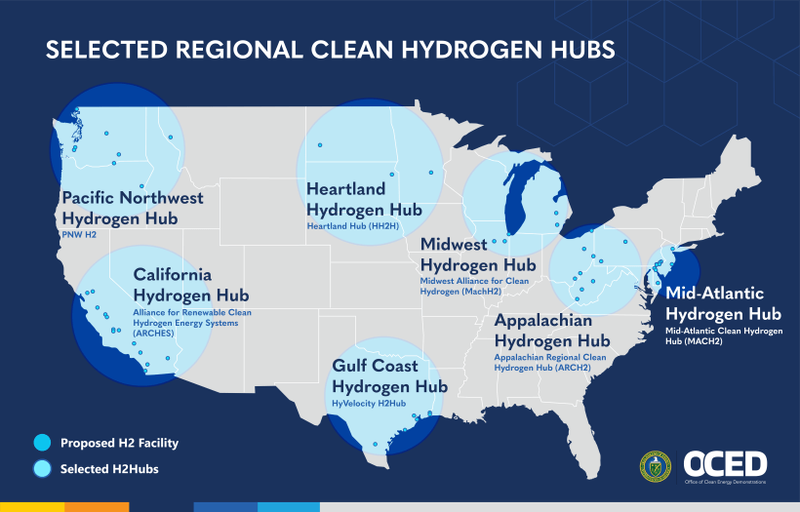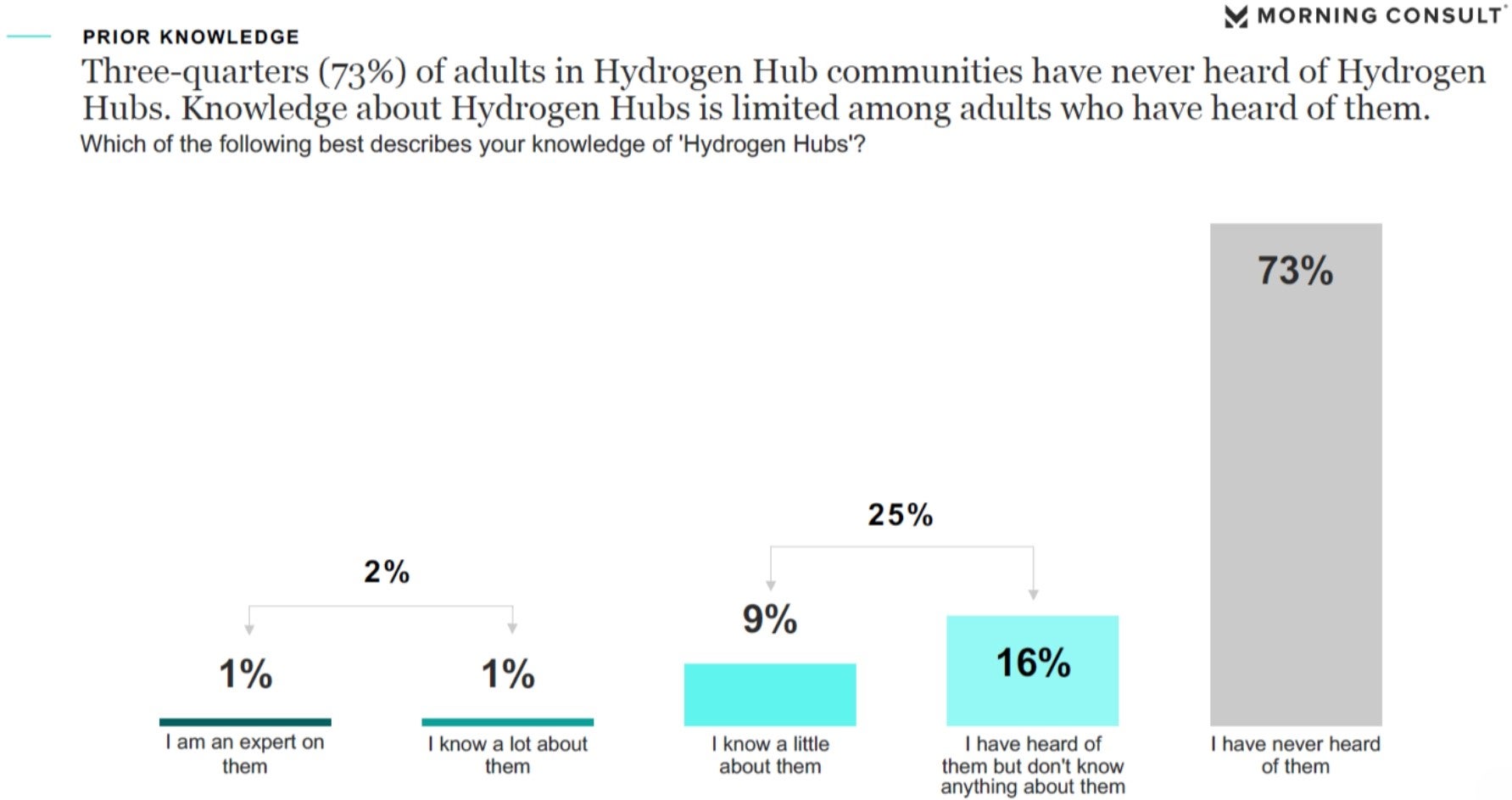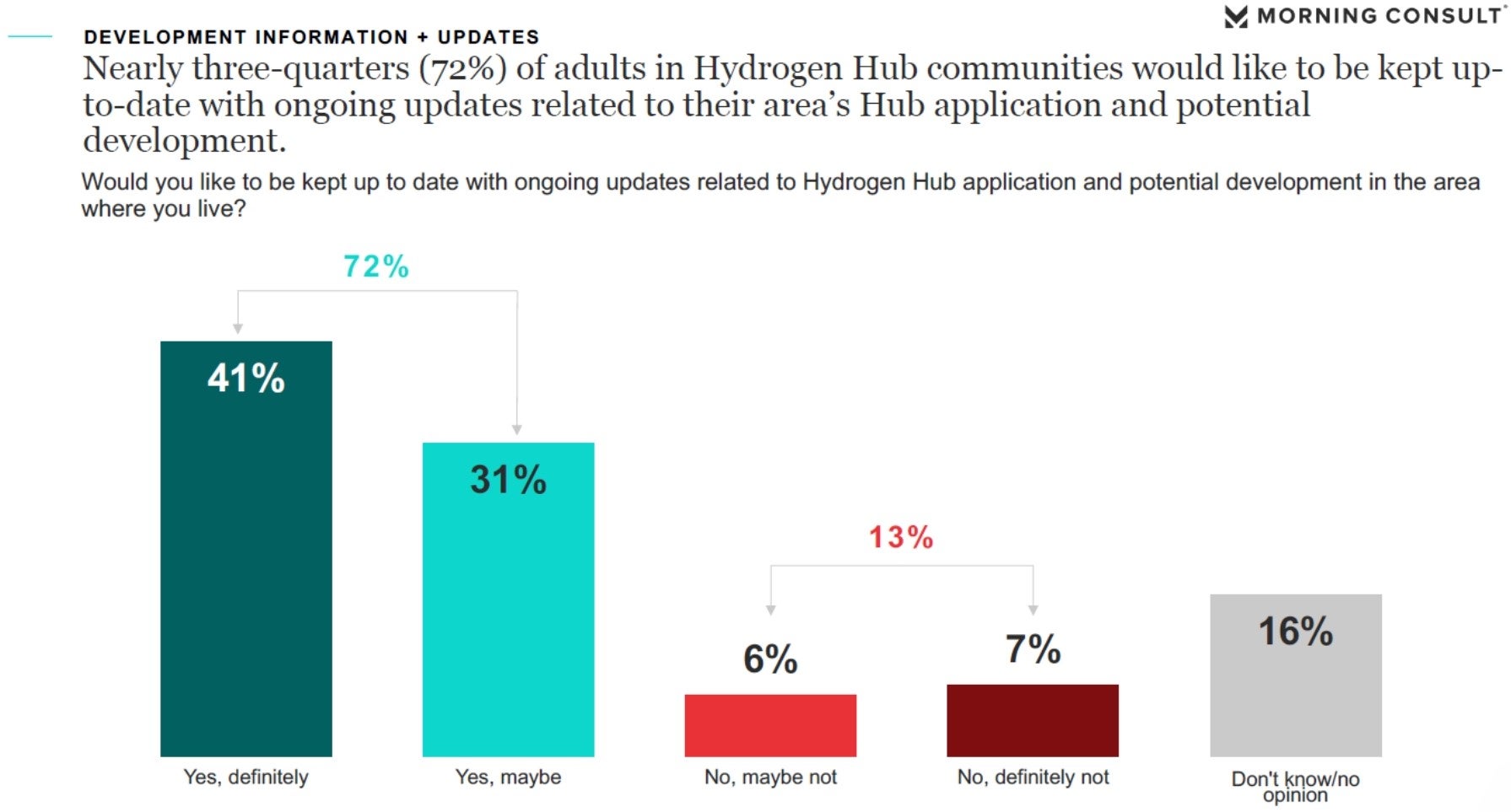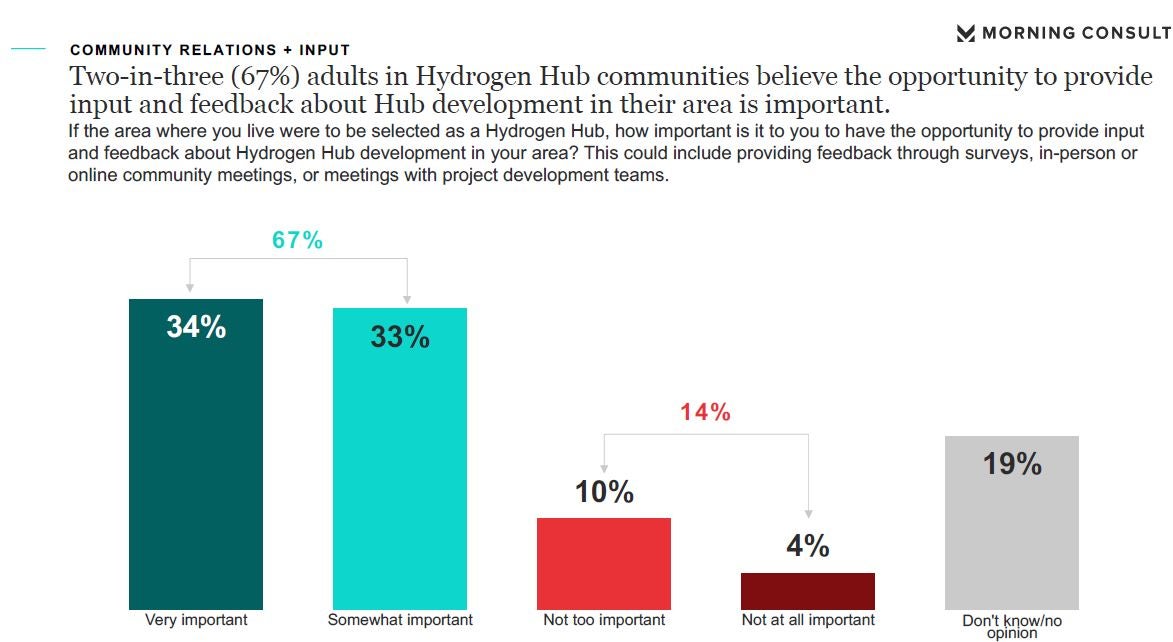In October, the White House announced the selection of seven Hydrogen Hubs around the U.S. to be a part of the Department of Energy (DOE)’s Regional Clean Hydrogen Hubs Program (H2Hubs), which will deploy $7 billion toward projects over eight to twelve years (or sooner). Launched under the Bipartisan Infrastructure Law, the Hydrogen Hubs program aims to create networks of hydrogen producers, consumers and infrastructure – and is likely to set many precedents that may scale-up in a clean hydrogen economy, ranging from technological strategies to the standard approaches for community engagement. Hub developers now enter their next, more in-depth planning phases to secure the coveted DOE funding and to eventually start building out the Hubs.
A primary challenge for these programs lies in translating strong technological innovation practices into responsible and collaborative on-the-ground infrastructure projects. This requires extensive engagement and partnership with local communities – a core part of EDF’s BetterHubs objectives – to mitigate potential harms and ensure the projects deliver positive outcomes and avoid additional related burdens for local communities. This is especially salient in the case of environmental justice communities, which have borne the burden of decades of environmental impacts and are a stated priority for DOE’s engagement as part of the Hub’s program.
While all Hub developers are required to engage and negotiate a Community Benefits Plan with communities, there are many details yet to be determined for most Hub proposals – including how best to engage communities, which communities will be impacted, and how to design and populate Community Oversight Committees. Underlying the success of these processes is the assumption that communities are starting from a position of empowerment. Have they been provided with access to information about what hydrogen development is, what it requires, the context that brings these specific projects to their neighborhoods? Have they been made aware or included in the planning of Hub proposals in their area? If they desire additional information and outreach, how would they like to be involved, and what kind of information would they trust and prefer?
EDF partnered with Morning Consult to conduct a survey in early October, during the week when Hub selection announcements were made. We asked community members who were located in zip codes associated with the 22 final stage DOE applications (as identified by Rystad Energy) a range of questions related to their area’s Hydrogen Hub application and received 600 responses.
First, a few caveats: It is very important to note that the survey results only provide insights relating to the 600 individuals who responded, from a random subset of respondents in specific zip codes geographically clustered near known Hub proposals. It was not able to distinguish between communities bordering the sites and those that are located further away within the same zip code area, which renders it unable to distinguish between populations that can experience different levels of impact. It also cannot and is not intended to indicate a community’s comprehensive perspective on the projects, or prove what a certain Hub may be doing or not doing in any of the communities we have polled. The data also does not explain the cause of a specific result – where communities report a lack of knowledge on a topic, the survey data alone cannot indicate the reason. The purpose of this blog is to lay out the results of this survey scientifically, with a recognition of these caveats, but we will offer our own interpretations of causes and what it implies for next steps in the conclusion.
Here’s what we learned:
1. Most participants were not aware of what Hydrogen Hubs are or that one was proposed for their region.
Survey results suggest that communities lack awareness around the Hubs and still have little information about what a Hydrogen Hub is. Nearly three-quarters (73%) of respondents reported that they have never heard of Hydrogen Hubs, and 86% say they’ve heard ‘not much’ (24%) or nothing at all (62%) about their local area applying to be a recipient of a future Hydrogen Hub project. Only 9% of respondents reported feeling informed about why their area has applied for Hub funding. When asked if community members had been contacted by Hub developers to provide input, only 5% of respondents confirmed that they had.
2. Community members surveyed want to be kept in the loop
The survey suggests that communities desire regular updates from Hub developers: 72% of survey respondents said they were interested in being kept up to date with project updates. Over half of respondents specified that they want updates early on in the project (53%). When asked what kind of information they would prefer, participants selected educational materials (48%) and news stories/investigative journalism (46%) as the preferred methods of learning.
When asked which sources of information they found most trustworthy, respondents indicated they would trust the following stakeholders “a lot” or “somewhat”: subject-matter experts (56%), community advocates (53%), and local and national non-profits or NGOs (52%). The least trusted sources were the federal government (38%), state government (41%), local government (42%) and businesses involved in the project (42%).
3. Those surveyed generally place high value on having opportunities to provide input on projects.
Along with receiving Hub updates, many respondents in our survey wanted to have the opportunity to influence the Hub projects. Two-in-three survey respondents shared that providing input and feedback was either “very important” (34%) or “important” (33%) to them.
A large majority of respondents (78%) also stated that it was important to negotiate a Community Benefits Agreement (CBA), which was defined in our survey as “an agreement between community groups and developers of large-scale projects designed to create a legally-binding framework in which developers agree to fund or provide certain benefits (e.g., parks, infrastructure, job training, affordable housing) to a community as part of the project development.” (Note: the DOE Hub application process requires Community Benefits Plans, which are an agreement with the Department of Energy focused on energy benefits, whereas CBAs are legally-binding and can cover a wider range of community priorities.)
4. Survey participants don’t yet have a clear sense of whether and how Hubs may present risks or benefits to their communities
According to the survey, close to half (46%) of respondents said they have not yet formed an opinion on the Hub’s potential impact on their community. When considering potential disadvantages of Hubs, the most frequently mentioned concerns were around the potential to worsen air quality (68%), loss of land to development or interruptions to wildlife or farming activities (68%), increased water consumption (68%), and safety risks of hydrogen (67%). Participants also flagged concerns around fairness – 67% expressed concern that “potential benefits will not be felt fairly by the local community”, and that “community views would [not be acted on] by businesses and government entities”.
When respondents were also asked about desired potential benefits arising from the Hubs, the most frequently mentioned priority was reduced household energy bills (79%). Other top priorities included potential air pollution reductions from cleaner energy use and environmental (76%) and environmental/climate benefits from clean energy (74%).
In conclusion
For the Hydrogen Hubs to create meaningful and lasting outcomes that benefit communities, Hub developers and DOE need to demonstrate genuine, diligent community engagement and partnership. These survey results, when combined with insights from community partners, environmental justice advocates, and EDF’s on-the-ground teams, suggests that respondents living near final-stage (or seriously considered) Hubs have not been provided sufficient information about these project proposals despite a desire for more information and opportunities to provide input.
This suggests significant work lies ahead for DOE and Hub developers to ensure projects are truly living up to the Biden Administration’s objectives of creating robust community engagement. One of the most fundamental first steps along this journey for DOE and Hub developers is increasing transparency around the projects, which EDF strongly advocates for such as within a recently published blog. EDF’s analysis and ongoing advocacy on what makes a ‘BetterHub’ can also be used to guide this road ahead, where the BetterHubs project advocates that Hubs should follow a genuine collaborative approach and lays out the need for “community groups to have the resources, support, and technical capacity necessary to participate substantively in the Hub planning and development process.”
EDF further recommends the following:
- Hub Developers and DOE must work hard to ensure that communities have easy access to relevant information.
- Due to lower levels of community trust in large, institutional stakeholders – including Hub developers and government officials – it will be important to support the distribution of information in partnership with subject-matter experts, community advocates and local and national NGOs.
- Hub developers should actively engage in understanding community priorities, including through discussions of CBPs and CBAs, and incorporate these needs.
- As part of their project planning and community engagement efforts, Hub developers should seek to ensure a wide distribution of community-identified benefits and to protect communities from potential risks.
While many of the recommendations above focus on DOE and Hub developers, it’s important to recognize that they are not the only important players, especially when connecting with communities on the ground. Many environmental justice and community organizations have been tirelessly engaged in various Hub processes and with their own communities to build capacity and advocate for their communities’ needs. The success of the Hydrogen Hubs program relies on empowering these stakeholders and achieving meaningful collaboration and partnership among them and within communities.
See the full survey results: Hydrogen Hub Development: Community Perceptions.



